ESR Aizhan Abdrassulova attends to “International Scientific and Practical Conference of Young Scientists”
On May 20, ESR Aizhan Abdrassulovapresented her research online at the Conference “International Scientific and Practical Conference of Young Scientists” in Ternopil, Ukraine with the topic “Data Ownership”. Aizhan explored the 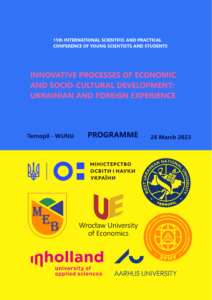 concept of data ownership, and its potential risks, and benefits, including data privacy and security concerns. Aizhan’s work was well-received by the audience who appreciated her insights and contribution to the conversation on data ownership.
concept of data ownership, and its potential risks, and benefits, including data privacy and security concerns. Aizhan’s work was well-received by the audience who appreciated her insights and contribution to the conversation on data ownership.
Additionally, during the months of May to June 2023, Aizhan completed her first secondment at the Vrije Universiteit 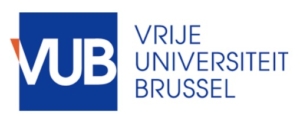 Brussel (VUB). The period at VUB provided Aizhan with valuable exposure to the academic community and allowed her to establish professional connections with other researchers in her field. During her secondment, she had the opportunity to collaborate with experts in her area of interest and further develop her research skills. She also had the chance to explore the city of Brussels and immerse herself in the local culture, which gave her a broader perspective on social and scientific issues. Through her participation in numerous scientific events, conferences, and seminars, Aizhan expanded her knowledge and gained new insights into the latest research findings and developments. Overall, her first secondment was a highly enriching and rewarding experience that helped her to grow both academically and personally.
Brussel (VUB). The period at VUB provided Aizhan with valuable exposure to the academic community and allowed her to establish professional connections with other researchers in her field. During her secondment, she had the opportunity to collaborate with experts in her area of interest and further develop her research skills. She also had the chance to explore the city of Brussels and immerse herself in the local culture, which gave her a broader perspective on social and scientific issues. Through her participation in numerous scientific events, conferences, and seminars, Aizhan expanded her knowledge and gained new insights into the latest research findings and developments. Overall, her first secondment was a highly enriching and rewarding experience that helped her to grow both academically and personally.




 In their collaboration, the ESRs combined their different research interests in law and machine learning, which enabled them to develop an interdisciplinary perspective on challenges posed by different approaches to data governance. The predominant part of the current discussion in EU data policy is centered around the challenging task of creating a data governance framework where data is ‘as open as possible and as closed as necessary’. In their article, the ESRs further elaborate on the concept of data collaboratives powered by decentralised learning techniques as a possible remedy to the shortcomings of existing data governance schemes.
In their collaboration, the ESRs combined their different research interests in law and machine learning, which enabled them to develop an interdisciplinary perspective on challenges posed by different approaches to data governance. The predominant part of the current discussion in EU data policy is centered around the challenging task of creating a data governance framework where data is ‘as open as possible and as closed as necessary’. In their article, the ESRs further elaborate on the concept of data collaboratives powered by decentralised learning techniques as a possible remedy to the shortcomings of existing data governance schemes. Data collaboratives have been described as new emerging forms of partnerships where privately held data is made accessible for analysis and where collaboration between participants is facilitated to unlock the public good potential of previously siloed data. [1] They thus fit well the EU policy shift that has taken place over the past years. Whilst for decades, the introduction of exclusive property rights was discussed as a potential tool to empower data subjects with regard to ‘their’ data and to facilitate the emergence of data markets, this changed with the 2020 European Data Strategy. Now, the potential of the data economy should be unlocked by facilitating data access and sharing. The authors presented their concept of data collaboratives powered by decentralised learning techniques, which can be used as a tool to reach the goals of the current EU data strategy: facilitate access to data while protecting privacy and intellectual property interests which individuals and companies might have with regard to ‘their’ data. The collaboration between the ESRs thus reflected the idea behind the LeADS project that solutions to existing tensions in the data economy require an interdisciplinary perspective from both law and data science.
Data collaboratives have been described as new emerging forms of partnerships where privately held data is made accessible for analysis and where collaboration between participants is facilitated to unlock the public good potential of previously siloed data. [1] They thus fit well the EU policy shift that has taken place over the past years. Whilst for decades, the introduction of exclusive property rights was discussed as a potential tool to empower data subjects with regard to ‘their’ data and to facilitate the emergence of data markets, this changed with the 2020 European Data Strategy. Now, the potential of the data economy should be unlocked by facilitating data access and sharing. The authors presented their concept of data collaboratives powered by decentralised learning techniques, which can be used as a tool to reach the goals of the current EU data strategy: facilitate access to data while protecting privacy and intellectual property interests which individuals and companies might have with regard to ‘their’ data. The collaboration between the ESRs thus reflected the idea behind the LeADS project that solutions to existing tensions in the data economy require an interdisciplinary perspective from both law and data science.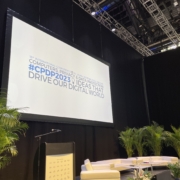

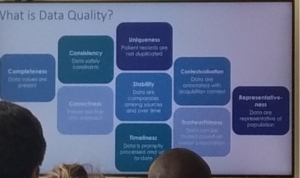
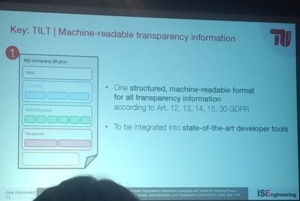 multinational health data-sharing efforts who were unsure about the usefulness of the EDHS for facilitating easier data sharing, as it seemed to only add EU certifications on top of specific national requirements (which were sometimes at odds).
multinational health data-sharing efforts who were unsure about the usefulness of the EDHS for facilitating easier data sharing, as it seemed to only add EU certifications on top of specific national requirements (which were sometimes at odds).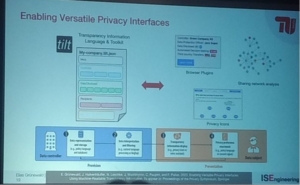

 Prof. Paul De Hert, one of LeADS supervisors, gave the Conference’s opening speech, introducing the new activities and the main topics discussed in 2023, such as the EDPB elections and the future of data protection in Europe in the face of recent EU Regulations.
Prof. Paul De Hert, one of LeADS supervisors, gave the Conference’s opening speech, introducing the new activities and the main topics discussed in 2023, such as the EDPB elections and the future of data protection in Europe in the face of recent EU Regulations. harms: A multidisciplinary, Antecipatory Perspective”, organized by one of LeADS beneficiary Interdisciplinary Centre for Security, Reliability, and Trust (SnT), University of Luxembourg (LU), exploring the harms posed by dark patterns – such as the cookie banners – and how to address them. Arianna was also a workshop facilitator at the workshop “Personalised Privacy; How can we leverage personalisation for better privacy protection?” organized by Maastricht University, Law and Tech Lab.
harms: A multidisciplinary, Antecipatory Perspective”, organized by one of LeADS beneficiary Interdisciplinary Centre for Security, Reliability, and Trust (SnT), University of Luxembourg (LU), exploring the harms posed by dark patterns – such as the cookie banners – and how to address them. Arianna was also a workshop facilitator at the workshop “Personalised Privacy; How can we leverage personalisation for better privacy protection?” organized by Maastricht University, Law and Tech Lab. panelist at a panel on “The Underuse of Personal Data, Its Opportunity, Costs, and EU Policies” organized by the University of Turin, which focused on how the underuse of personal data can pose risks to society, such as hindering technological development of health research.
panelist at a panel on “The Underuse of Personal Data, Its Opportunity, Costs, and EU Policies” organized by the University of Turin, which focused on how the underuse of personal data can pose risks to society, such as hindering technological development of health research.